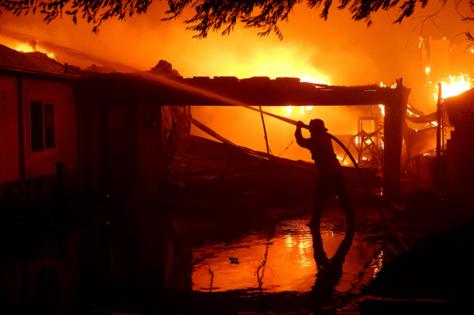California needs federal help after Los Angeles fires. Why is Congress so slow to act?
Published in Political News
WASHINGTON — Just before Christmas, Congress approved billions of dollars in relief funds to help victims of devastating wildfires in Maui and Hurricanes Helene and Milton in the Southeast.
Congress was acting a year and a half after the Hawaii disaster, and two months after Western North Carolina and other areas were devastated.
Now lawmakers are expected to try to help those affected by the still-developing Los Angeles area wildfires.
While some federal emergency relief funds will come to victims quickly, additional money to rebuild infrastructure, homes and businesses is likely to flow much more slowly.
“It’s unpredictable how long it will take,” said Sarah Labowitz, nonresident scholar in the sustainability, climate and geopolitics program at the Carnegie Endowment for International Peace.
That’s because disaster rebuilding efforts invariably get tied up in politics.
President-elect Donald Trump, who takes office Monday, has been highly critical of California officials’ efforts to prevent such wildfires. He hasn’t threatened to take away any fire-related aid, though he has threatened to withhold aid to the state in the past.
Some congressional Republicans have recently had questions about aid requests. Republicans are eager to cut spending.
House Speaker Mike Johnson told CNN this week that there had been some discussion about trying any aid to raising the debt limit, always an incendiary issue.
Unless the limit is raised, eliminated or suspended, the government will lack the resources to pay its bills.
Trump has urged ending any ceiling on debt. Republicans usually want to tie any increase in the limit to spending cuts.
“It appears to us that state and local leaders were derelict in their duty in many respects,” Johnson told reporters Monday. ”There should probably be conditions on that aid. That’s my personal view.”
But California needs the help now, said Rep. Luz Rivas, D-San Fernando.
“It’s crucial that we continue to work together to make sure of federal aid, without any conditions,” he said.
Sen. Thom Tillis, R-N.C., whose state was battered in September by Hurricane Helene, had the same thought.
“I don’t think there should be conditions,” he said.
Helping fire victims
Federal help can include a variety of aid programs.
The Federal Emergency Management Agency has a pot of money—replenished last month—that can provide immediate help to disaster victims.
“There is a process and the process is functioning,” said Labowitz.
Congress approved $29 billion in December for the FEMA disaster assistance fund.
Biden has issued a Major Disaster Declaration for areas affected by the California fires That means that through the disaster assistance fund, people are able to apply for help with food, shelter, medicine and other essentials. More information is available on FEMA’s website.
Congress also approved last month $31 billion for disaster and economic aid to agriculture producers, $8.1 billion for federal highway and bridge repairs and $12 billion for the Community Development Block Grant Recover program. That helps local, state and Tribal governments begin to rebuild, particularly in lower income areas.
But money for those programs needs to be reauthorized this spring, and that’s where the politics, and usually the exasperation come in.
In September, 13 months after the Maui wildfires that killed at least 102 people, Sen. Brian Schatz, D-Hawaii, expressed his frustrations in a Senate speech.
All people want, he said, “is help and a little bit of hope to get their lives back to something close to normal. What are we doing as a Congress if we can’t even deliver help to our fellow Americans when disaster strikes?”
In November, two months after Hurricane Helene hit North Carolina and parts of the Southeast, leaving at least 219 people dead, Tillis testified before the Senate Appropriations Committee.
“We’ve got to react differently to storms. This may be the first, but it won’t be the last, like we’ve seen in North Carolina, and we owe it to the American people to be ready to do better,” he said.
Will money be approved?
Ultimately, it’s expected California will get decent amounts of funding to help rebuild.
The process slows for two reasons.
“Congress is not a quick institution to begin with,” said Thomas Birkland, professor of public policy at North Carolina State University. Approving spending legislation usually requires not only lengthy negotiations but a lot of time on the House and Senate floor to debate and add and subtract.
And questioning spending can be good politics in places that are unaffected.
But, Schatz told The Bee, other factors ultimately drive politicians to provide the funds.
“This idea that aid will be withheld will last as long as it takes for the next red state disaster to occur. As soon as there is a balance of interest Congress will taken action,” he said.
After all, said Labowitz, when it comes to disasters, “No one is immune from these climate extremes.”
_____
©2025 McClatchy Washington Bureau. Visit mcclatchydc.com. Distributed by Tribune Content Agency, LLC.




























































Comments